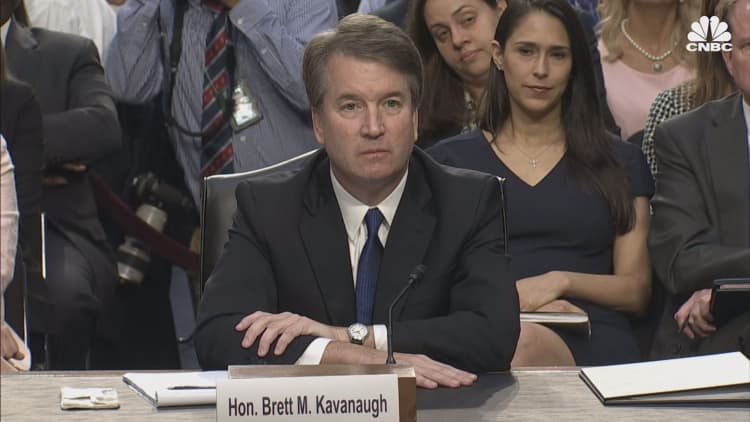
The confirmation hearings for Trump Supreme Court nominee Brett Kavanaugh got off to a raucous start on Tuesday, with Democratic senators calling for the hearings to be adjourned before they started and protesters chanting in the audience.
Republican Charles Grassley of Iowa, chairman of the Senate Judiciary Committee, struggled to maintain order.
President Donald Trump nominated Kavanaugh in July to fill the seat of retired Justice Anthony Kennedy, who often provided the decisive swing vote in numerous decisions. If confirmed, Kavanaugh could solidify the conservatives' majority on the nine-member court.
Kavanaugh prepared for his hearing with at least six practice sessions that mimicked possible scenarios he could face in dealing with hostile members of the committee. As protesters yelled, Kavanaugh looked forward.
Sen. Kamala Harris, D-Calif., interrupted Grassley at the start of the hearing to demand a delay until the senators had time to review a paper trail from Kavanaugh's time in the George W. Bush White House. More than 40,000 pages of documents were released Monday night.
Calling the hearing a "charade and mockery of our norms," Sen. Richard Blumenthal, D-Conn., also demanded a postponement.
"What are we trying to hide? Why are we rushing?" asked Sen. Patrick Leahy, D-Vt.
Sen. John Cornyn, R-Texas, likened the Democrats' demands to "mob rule."
The Democrats' opening gambit was planned with the help of Senate Minority Leader Chuck Schumer, D-N.Y., NBC News reported, citing unidentified sources.
Kavanaugh was the White House staff secretary under Bush, and produced hundreds of thousands of pages of documents that Democrats have sought to gain access to. Bush's legal team turned over more than 400,000 pages of documents ahead of Tuesday's hearings. Trump's claim of executive privilege blocked the release of more than 100,000 additional pages.
"This entire process has cast a cloud over Judge Kavanaugh," said Sen. Dianne Feinstein, D-Calif., the top Democrat on panel. "We go to these hearings under protest."
Some of the most vocal opposition at the hearing came from Sens. Cory Booker, D-N.J., Amy Klobuchar D-Minn., and Harris, all considered potential 2020 presidential contenders. Klobuchar is the only one of the three who will face an election this year, though her seat is considered safe.
At one point, Grassley was forced to defend his integrity in the face of Democratic attacks.
"You spoke about my decency. You spoke about my decency and integrity and I think you are taking advantage of my decency and integrity," Grassley said.
Addressing Sen. Mazie Hirono, D-Hawaii, who said the hearing was "unprecedented" and "not regular order," Grassley said that "I would ask that you stop so that we can conduct this hearing the way that we have planned it."
"Maybe it is not going exactly the way the minority would like to have it go, but we have said for a long period of time that we were going to proceed on this very day, and I think we ought to give the American people the opportunity to hear whether Brett Kavanaugh should be on the Supreme Court or not," Grassley said.
Trump weighed in later in the day, writing in a post on Twitter that the hearings were a "display of how mean, angry, and despicable the other side is."
Heading into the hearings, polling showed that Kavanaugh was unpopular among Americans, with a plurality telling Fox News in August that he should not be confirmed. An August poll conducted for CNN showed that only 37 percent of Americans supported Kavanaugh's confirmation, making him the least popular nominee since Robert Bork, who was nominated by Ronald Reagan in 1987. Bork was rejected by the Senate, with only 42 votes in favor of his confirmation.
In a statement posted to Twitter, Grassley's office said that Democrats had "no objection to Judge Kavanaugh's character, jurisprudence or qualifications, so they are resorting to unprecedented, desperate delay tactics in a coordinated political strategy led by @SenSchumer."
Democrats have raised objections to Kavanaugh's previous rulings and statements on executive power, reproductive rights and other matters, and argued that Trump should not be permitted to name a nominee to the high court as he remains under investigation by special counsel Robert Mueller.
Despite their objections, there is no clear path for Democrats to block Kavanaugh's confirmation. Republicans hold a narrow majority in the Senate, and some centrist Democrats up for re-election in red states are thought likely to depart from the party line.
Democratic Sens. Joe Manchin of West Virginia, Heidi Heitkamp of North Dakota and Joe Donnelly of Indiana are considered possible "yes" votes for Kavanaugh's confirmation. The three senators all voted to confirm Trump's last nominee to the Supreme Court, Justice Neil Gorsuch, and they are considered vulnerable in the November midterm elections.



